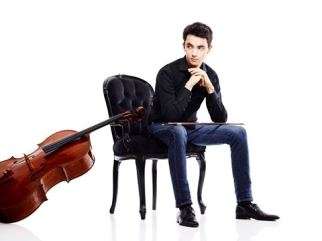|
Back
Vive le French Répertoire Philadelphia
Verizon Hall
10/07/2016 - & October 8, 2016
Hector Berlioz: Le Corsaire Overture, Op. 21 – Symphonie fantastique, Op. 14
Camille Saint-Saëns: Cello Concerto No. 1 in A minor, Op. 33
Stéphane Tétreault (cello)
The Philadelphia Orchestra, Yannick Nézet-Séguin (conductor)

S. Tétreault (© Luc Robitaille)
Conductor Yannick Nézet-Séguin has been holding off programming French repertoire in the four years he has been musical director of the Philadelphia Orchestra, but he’s gearing up for a French festival in 2017 and is weighing in already with a season opener of works by Camille Saint-Saëns and Hector Berlioz.
Things got off to a rocky start for The Philadelphians on September 30, when the annual fundraiser concert with Yannick conducting a special gala program was a no show. Phil Orch’s CEO Alison Vulgamore finally came onstage and announced it the gala concert and weekend performances of Mozart’s Grand Mass were cancelled as well because the musicians were on strike. They were picketing on Broad Street in front of the Kimmel Center, with the semi-formal dress event with donors and patrons commencing with the dinner in Verizon’s Hall’s main lobby.
The musicians rejected the prospect of another pay and benefit shortfall, contract negotiations reached a stalemate earlier that day. The dramatic exit forced a settlement within 48 hours, and the concert season commenced less than a week later with Sir Simon Rattle conducting Mahler’s Sixth Symphony, and followed by Nézet-Séguin back on the podium, all smiles, but not saying a word about the previous week and launching into Berlioz’s Le Corsaire Overture, an unabashed showpiece and the orchestra giving it a sharp, near garish luster.
Next, an altogether engrossing performance of Saint-Saëns’ First Cello Concertocomposed in 1872, and still sounding innovative as a challenging single movement concerto. The orchestral drive and interlocks by soloist Stéphane Tétreault, in his debut performance with the Philadelphians, impressed from every angle. At age 23, Tétreault possesses commanding interpretive and illuminating the modernist merits of this concerto. His eyes rarely left Nézet-Séguin’s conducting and he smiled frequently at the sound of the orchestra, his body reacting with little spasms, reflective to the thrust of the orchestra. In fact, Tétreault was rapturously inside the architecture of this music and his playing exemplar of French lyrical line, passionate and unsentimental, its musicality utterly human.
Berlioz’s Symphonie fantastique so warmly conjured with immediacy by Nézet-Séguin, full of symphonic mystique, then giving way in equal parts as a full concerto for orchestra. Nézet-Séguin establishes early the chamber like orchestral translucence that keeps this piece glowing. The second movement “Ball” opens with a transporting harp quartet led by the luminous sound of principal harpist Elizabeth Hainen. And as the ethereal turns very earthy as Nézet-Séguin again shows his magic touch with any waltz, the ironies roiling under the effervescent surface. The “Meadows” Adagio was a bit dimensionless, but the fiery drama of ‘March to the Scaffold,’ Berlioz’s symphonic opiate dreams, rescued, the French Liberté themes bursting forth. Then the dizzying “Witches’ Sabbath” highlighting the swagger of the orchestra’s beefed up brass and percussion, the precision gallop of the violins and the deep sonority of the lower strings. Among the outstanding lead soloists Jeffrey Khaner (flute), Ricardo Morales (clarinet), Elizabeth Starr Masoudnia (English horn), Daniel Matsukawa (bassoon) and the inestimable Jeffrey Lang (French horn).
Lewis Whittington
|